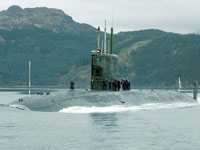The
Trafalgar is essentially a refinement of the Swiftsure class and
designed six years later than its predecessor. The design included a
new reactor core and the Type 2020 sonar.
Internal
layout is almost identical to the Swiftsure, and it is only 2.5 metres
longer.
The
Trafalgar class have strengthened fins and retractable hydroplanes,
allowing them to surface through thick ice.
The hull is also covered in anechoic tiles which are designed to
absorb sound rather than reflect it, making the boats more difficult
to detect with active sonar.
The major change was in propulsion. Rather than the seven/nine-bladed
propeller used by the Swiftsures, Trafalgar class submarines use
pump-jet propulsion - a high-pitch, low-revolution propeller which is
much quieter but much heavier than conventional propeller designs.
Development of this system was not complete in time for installation
in the class's name-ship vessel, HMS Trafalgar, and so the pump-jet
was first used in the second in the class, HMS Turbulent.
The first Trafalgar class submarine was ordered on April 7, 1977 and
completed in 1983. Turbulent was ordered on July 28, 1978; Tireless on
July 5, 1979; Torbay on June 26, 1981; Trenchant on March 22, 1983;
Talent on September 10, 1984; and finally Triumph on July 3, 1986.
In 1993 Triumph sailed to Australia, covering a distance of 41,000
miles whilst submerged and without any forward support. This marked
the longest solo deployment by any British nuclear submarine.
The Trafalgar class was to be replaced by the Future Attack Submarine
(FASM), however this project was effectively cancelled in 2001 and
replaced by the Maritime Underwater Future Capability. It seems likely
that the Astute class will replace the Trafalgar class as well as the
Swiftsure class.
|
TRAFALGAR CLASS Specifications |
|
Country of Manufacture |
United Kingdom |
|
Number in Service |
7 |
|
Crew |
18 officers and 112
ratings |
|
Armament |
5 x 533mm (21in)
tubes for Twenty Mk 24 Tigerfish wire-guided and Mk 8 anti-ship torpedoes,
Up to 50 x Mk 5 Stonefish or Mk 6 Sea Urchin mines instead of torpedoes, 5
x UGM-84A Sub Harpoon tube-launched anti-ship missiles |
|
Length |
85.4m |
|
Beam |
9.8m |
|
Draught |
8.2m |
|
Displacement |
4,700 tons surfaced 5,200 tons submerged |
|
Powerplant |
Rolls Royce pressurised water-cooled reactor
supplying steam to two sets of General Electric geared turbines delivering
15,000shp to one shaft |
|
Performance |
Speed 20 knots surfaced,
32 knots submerged |
|
First of Class |
1981 |

